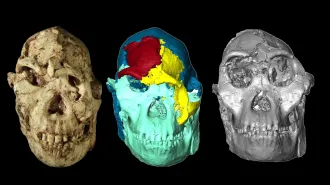Letters from the December 3, 2005, issue of Science News
Eye on energy
“Cosmic Ray Font: Supernova remnants rev up ions” (SN: 10/1/05, p. 213) is unfortunately murky. It’s confusing to state that accelerating charged particles to high speeds “therefore” produces cosmic rays. And what “charged particles”? Is the “energized” gas in fact “ionized”? “Energized” is too general a word. Finally, why are high-speed particles more easily compressed than slower-moving material?
Fredric Blum
Merion, Pa.
“Energized” means that the charged particles, existing electrons and ions, are speeded up to energies high enough to qualify as cosmic rays. Einstein’s theory of special relativity describes why a high-speed gas is especially compressible. For less-than-obvious reasons, that theory dictates that if two groups of particles have the same energy but only one is moving close to the speed of light, the latter group—in this case, ions—will exert less pressure and so will be more compressible.—R. Cowen
You be the judge
In general, a judge is an independent legal expert. To expect a legal expert to be able to determine the validity of the scientific information is no more reasonable than to expect a scientist to be able to do a good job of making legal judgments (“Benched Science: Increasingly, judges decide what science—if any—a jury hears,” SN: 10/8/05, p. 232).
Thomas Bradley
Poway, Calif.
If I remember correctly, expert witnesses in British courts are hired by the judge. Not only would this reduce the likelihood of biased testimony, it could also give judges a window into scientific inquiry. I think most U.S. citizens, not just judges, need to learn about scientific and statistical methods. Most people are easily misled by incomplete and poorly designed experiments and misused statistics. Until the average citizen learns to avoid these things, judges, being only human, can’t be expected to.
Phil Long
Derry, N.H.
About 200 years ago, coerced testimony was recognized as useless for arriving at truth in a court of law. The same can be said of paid testimony. No matter whether it’s an armed robber receiving 10 years off his sentence for testifying against another suspect or a scientist given cash to testify in a civil suit, paid testimony and justice are incompatible.
Peter Wilson
Simi Valley, Calif.







